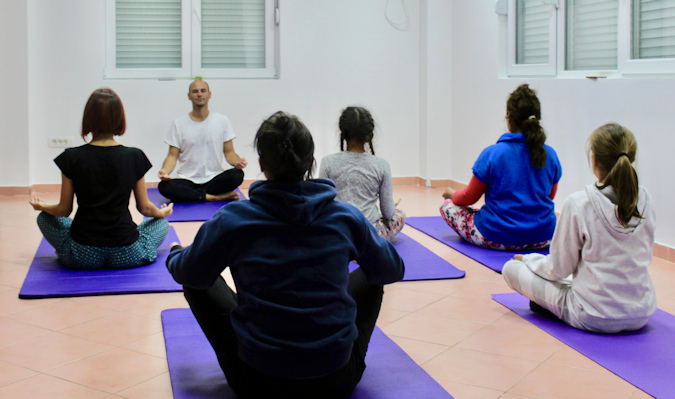Yoga and self-defence to help cope with gender-based violence in Montenegro
Date:

A non-governmental organization in Montenegro is using non-traditional approaches to support women survivors of violence.
SOS Nikšić, one of the oldest civil society organizations addressing domestic violence in Montenegro, is partnering with UNDP Montenegro, under the EU–UN Women Regional Programme ‘Implementing Norms, Changing Minds’ to train women on integrated security. The training includes both physical and psychological self-defence techniques. In 2016, they introduced yoga classes as part of their support to survivors.
Located in Niksic, about 55 kilometers north of the capital Podgorica, the organization manages a shelter and is coordinating the recently established National SOS Helpline for domestic violence in Montenegro. Through their protection programme, SOS Niksic provides support for women survivors of violence, including through phone counseling, meals, accommodation and free legal and psychological counseling. In addition, the organization is a licensed organizer of adult education by the Ministry for Education for multiple groups of socially marginalized women.
"Yoga perfectly supports our work with survivors. It is based on a good understanding of the concept of self-power. Yoga helps a survivor to focus her attention on her own strengths and regain energy, and in this way restore control over her life," explains Nataša Međedović, Director of SOS Nikšić.
“Yoga helps us to realize that we are humans, loved, universally useful and unique beings. This awareness gives us strength to continue with our lives. Yoga also helps to improve muscle and joint flexibility, body coordination, strength and overall fitness, as well as breathing and balance. Knowing self-defence, on the other hand, can be helpful in reducing the risk of aggression and to increase self-confidence,” explains Nikola Ignjatović, the instructor at the shelter.
The programme, which covers methods for physical and psychological self-defence, has brought together both activists and survivors to redefine the concept of women’s power.
“During my stay in the shelter, my children and I had a lot of support. I really felt good at the yoga and self-defence classes. I felt full of energy and more confident. Personally, these classes helped me to stay calm. Now I am more disciplined and have started practicing it by myself,” says Tatjana Simović*, a survivor who spent nine months in the shelter.
Ivana Radonjić*, one of the shelter hotline operators, describes the benefits: “I became acquainted with the many advantages of yoga and meditation, which help me to alleviate and channel stress. It has also helped me to develop a greater sense of community and closeness with beneficiaries and colleagues.”
“After these sessions, I feel very relaxed, happy and fulfilled. I learned how to defend myself and to better appreciate myself,” says Dragana Martinović*, another beneficiary of the yoga and self-defence classes.
"UNDP strongly supports innovative approaches to working with survivors of gender-based violence, especially those that are based on empowerment and regaining a sense of self-worth and self-esteem. These are important not only in coping with traumatic experiences and moving forward, but also in making sure that we break the cycle of violence," explains Vanja Šćepović, Gender Programme Coordinator at UNDP Montenegro.